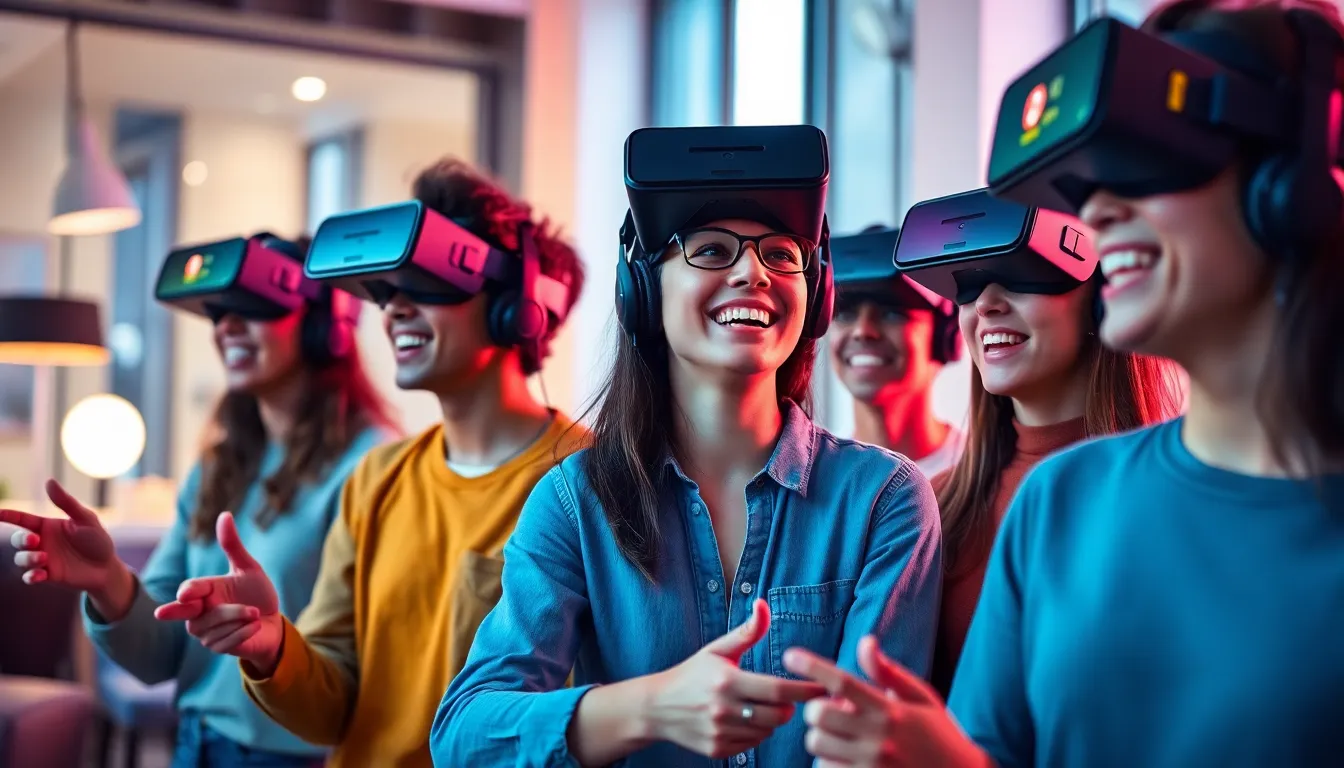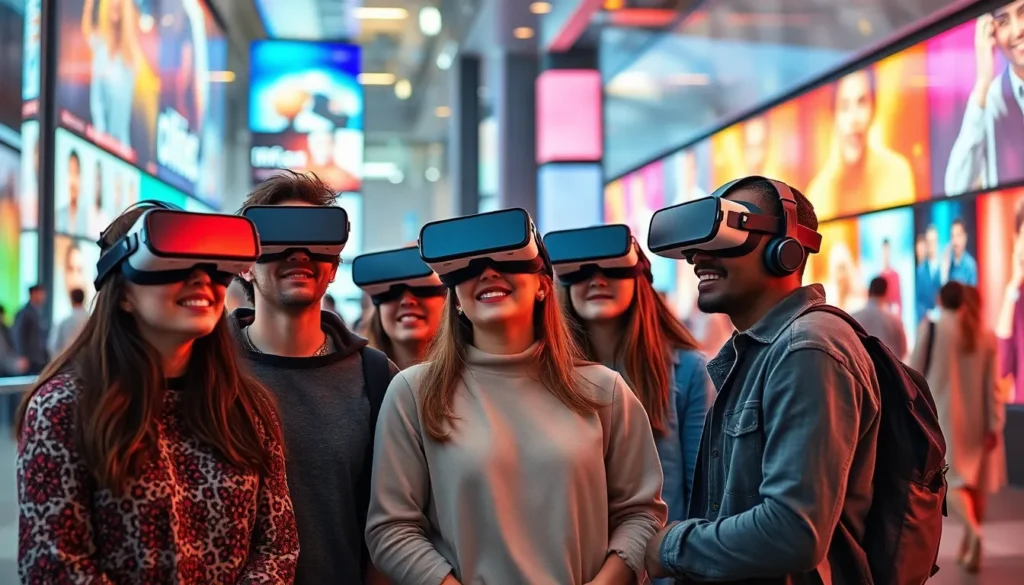Social media has transformed how people connect and share their lives, but what’s next? Imagine a world where virtual reality and artificial intelligence collide, creating immersive social experiences that make current platforms look like dial-up internet. The future of social media technology promises to be as thrilling as a cat video going viral, but with a sprinkle of sci-fi magic.
Table of Contents
ToggleOverview of Social Media Technology
Social media technology has transformed communication and interaction in various ways. Platforms like Facebook, Twitter, and Instagram connect billions of users globally. Their algorithms analyze user behavior, personalizing content and enhancing engagement. As technology evolves, social media integrates more advanced features, including augmented reality and AI-driven recommendations.
Data privacy concerns affect social media platforms significantly. Users increasingly demand transparency regarding data collection and utilization. In response, companies adopt better privacy measures to protect user information. Regulatory bodies now enforce stricter data protection laws, impacting how platforms operate and design their features.
Mobile technology influences social media’s evolution. With over 4 billion mobile users worldwide, optimizing platforms for smartphones has become crucial. Apps now offer seamless experiences, enabling real-time sharing of content, whether photos, videos, or live streams. Instant notifications keep users engaged and informed, promoting continuous interaction.
Real-time communication remains a core aspect of social media technology. Messaging services like WhatsApp and Facebook Messenger facilitate instant conversations, allowing users to connect with friends and family across the globe. As demand for video content grows, platforms increasingly incorporate features like live video broadcasts and short-form content, catering to user preferences.
Future developments in social media technology promise exciting advancements. Enhanced virtual reality experiences may redefine social interactions, creating immersive environments for users. Artificial intelligence could further personalize content, making interactions more meaningful. As these technologies converge, social media may become an even more integral part of everyday life.
Current Trends Influencing Social Media

Several key trends currently shape the landscape of social media technology. These trends are driving innovation and enhancing user engagement across platforms.
Rise of Artificial Intelligence
Artificial intelligence plays an increasingly significant role in social media. AI algorithms enhance content curation, ensuring users receive tailored experiences. Platforms utilize AI for chatbots, improving customer service and engagement. Predictive analytics allow businesses to better understand user behavior, leading to more effective marketing strategies. Additionally, AI-driven tools automate content moderation, ensuring platforms maintain safe environments. As AI technology advances, social media interactions continue to become more personalized and efficient.
Integration of Virtual Reality
Virtual reality integration transforms how users interact on social media. Immersive experiences allow individuals to socialize in virtual environments, redefining connectivity. Platforms like Facebook Horizon facilitate remote gatherings, bridging geographical gaps. Gamification elements in virtual spaces foster community building and user engagement. Furthermore, virtual events attract broader audiences, creating opportunities for brands and influencers. Enhanced visual and interactive experiences promise to reshape social media dynamics, making interactions more engaging and memorable.
Predictions for the Future of Social Media Technology
The future of social media technology promises to elevate user experiences and strengthen privacy measures.
Enhanced User Experience
User experiences will likely become more immersive with advancements in virtual reality. Platforms could integrate augmented reality features, allowing users to interact with 3D content seamlessly. Enhanced AI algorithms might tailor content, providing personalized feeds that reflect individual preferences. Instant communication tools are expected to evolve into more intuitive interfaces, fostering deeper connections among users. Video content will dominate, supported by faster loading times and higher resolution displays. User-generated content may gain importance as communities prioritize authenticity in interactions. These developments will lead to more engaging and meaningful user experiences across platforms.
Privacy and Security Developments
Privacy and security are set to become paramount as social media evolves. Users increasingly demand transparency regarding data usage and protection. Enhanced encryption methods may protect personal information better, ensuring that user data remains secure. Companies are likely to adopt stricter regulations to comply with evolving privacy laws. Blockchain technology could play a crucial role in securing transactions and user identities on social platforms. Users might see features that allow them to control their data more effectively, deciding what to share and with whom. These proactive measures will address privacy concerns, enhancing user trust across social media channels.
Impact on Society and Communication
Social media technology profoundly influences society and communication. Enhanced connectivity allows individuals from diverse backgrounds to engage in real-time discussions. Users leverage various platforms to express opinions, share experiences, and mobilize around social causes. Engagement in this digital environment fosters community building, transcending geographical boundaries.
Social issues are often amplified through viral campaigns. Activism, for instance, thrives on platforms like Twitter and Instagram, where hashtags can spark movements. Social media becomes a tool for raising awareness about pressing matters, leading to collective action. In this way, individuals gain a voice, influencing public discourse and policy.
Shifts in communication preferences also emerge as social media evolves. Short-form content, often seen in TikTok videos, garners attention, reflecting audiences’ fast-paced lives. Visual storytelling dominates, appealing to users seeking instant gratification. This trend compels creators and brands to adapt strategies, focusing on captivating imagery and engaging narratives.
Concerns surrounding data privacy and security arise as social media grows. Users increasingly demand transparency from companies about their information practices. Heightened awareness regarding data protection drives businesses to implement stricter measures. Such actions aim to instill trust and encourage user retention, navigating the delicate balance between personalization and privacy.
Communication habits continue to adapt as emerging technologies shape user interactions. Increased use of AI-driven tools streamlines customer service, enhancing user experiences. Innovations like chatbots provide instant responses, fulfilling user needs efficiently. Furthermore, virtual reality platforms offer immersive experiences that redefine online interaction, fostering deeper connections among users.
Social media’s impact extends beyond personal interactions. Businesses recognize the potential for targeted marketing strategies that leverage user data. Successful campaigns utilize algorithms to optimize content delivery, reaching potential customers effectively. As a result, companies cultivate relationships with audiences, enhancing brand loyalty through engagement.
The future of social media technology promises to be transformative and thrilling. As virtual reality and artificial intelligence intertwine, users can expect a more immersive and personalized experience. Enhanced privacy measures will foster trust while real-time communication continues to thrive.
Platforms will evolve to meet the demands for richer content and deeper connections. The shift towards video and short-form content will redefine engagement strategies for creators and brands alike.
With these advancements, social media will not only remain a vital communication tool but also a powerful catalyst for social change and community building. The journey ahead is filled with potential, and the excitement surrounding these developments is palpable.





